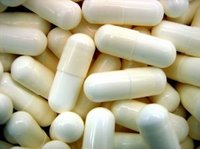 Healthcare professionals have long sought to change the Dietary Supplement Health and Education Act (DSHEA). The pharmaceutical and weight loss industries have realized it is in their best interests to do so, too. While they educate the public on the ineffectiveness and possible dangers of these unregulated (and competing) products, some valuable information is coming out of the debates.
Healthcare professionals have long sought to change the Dietary Supplement Health and Education Act (DSHEA). The pharmaceutical and weight loss industries have realized it is in their best interests to do so, too. While they educate the public on the ineffectiveness and possible dangers of these unregulated (and competing) products, some valuable information is coming out of the debates.As the founder and director of a weight loss center told NBC’s Today Show viewers on November 13th, “Americans spend $1 billion on non-prescription weight loss products and none of them work.”
[This figure doesn’t even include the prescription ones, weight loss programs and surgeries!] The news segment went on to report:
Recent studies show that two thirds of Americans think that the government requires warnings about the side effects of these products and about half believe that the U.S. Food and Drug Administration (FDA) has approved these products’ safety and efficacy. Both are not true.
Advertising of these products is often misleading. At best, you simply waste your money. At worst, the products can be unsafe and damage your health....
The unproven claims of products that tout quick weight loss may be unethical, but they are not illegal. These products are usually a bad idea either for your health, wallet — or both. But if you insist on taking them, at the very least, make sure the manufacturer provides an 800 consumer phone number you can call to ask questions about the product’s documented safety and purity. If you’re on prescription medications, check with your doctor before taking these products to avoid harmful interactions. Most of all, remember, when it sounds too good to be true, it probably is.
The Los Angeles Times just published a special report examining the dubious health claims of over-the-counter health products and how to spot them.
...[M]any of us are happy enough to believe in the healing powers of magnetic bracelets or infrared lamps. And just a couple of years ago, people flocked to buy Seasilver, a big-selling blend of seaweed, aloe vera and other herbal ingredients that was purported to cause permanent weight loss while curing AIDS, cancer, anthrax and nearly 650 other diseases — enough to make the Revigator look like a sugar-pill dispenser.
Health products have changed over the decades, as have many of the buzz words they use to lure customers: Today's products are more likely to "harmonize" and "optimize" than to "revigorate" or "revitalize." They've also updated their sciency-sounding claims...
Since the FTC and the Food and Drug Administration don't have enough resources to go after every product sold under false pretenses, [Matthew ] Daynard says, it's largely up to consumers to protect themselves and put deceptive marketers out of business....Staying vigilant is hard work because it goes against our basic human instincts, says Joe Nickell, a senior research fellow with the Committee for Skeptical Inquiry who has investigated bogus Mexican cancer clinics and other forms of quackery. The deep desire to feel better can easily push aside questions and doubts, he says. "Quack treatments appeal to emotions. People stop thinking with the organ above their neck. They think with their heart or their gut."
We may know more about health and medicine than previous generations, but all of that progress hasn't dampened our wishful thinking, especially in the face of illness, Nickell adds. "A little voice may tell you that it's a long shot, but you put that voice aside," he says....
The article goes on to include a guide for how to recognize quackery, including in weight loss products, and how consumers can protect themselves from being hurt. We can never put our guard down, though, even when we hear about tried-and-true weight loss methods and recommendations to look for products manufactured by large pharmaceutical companies.